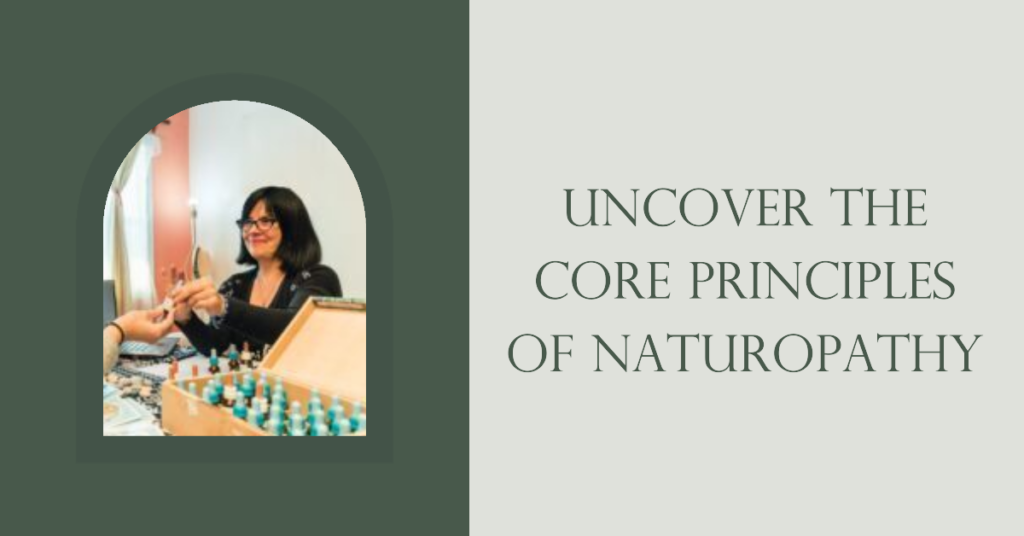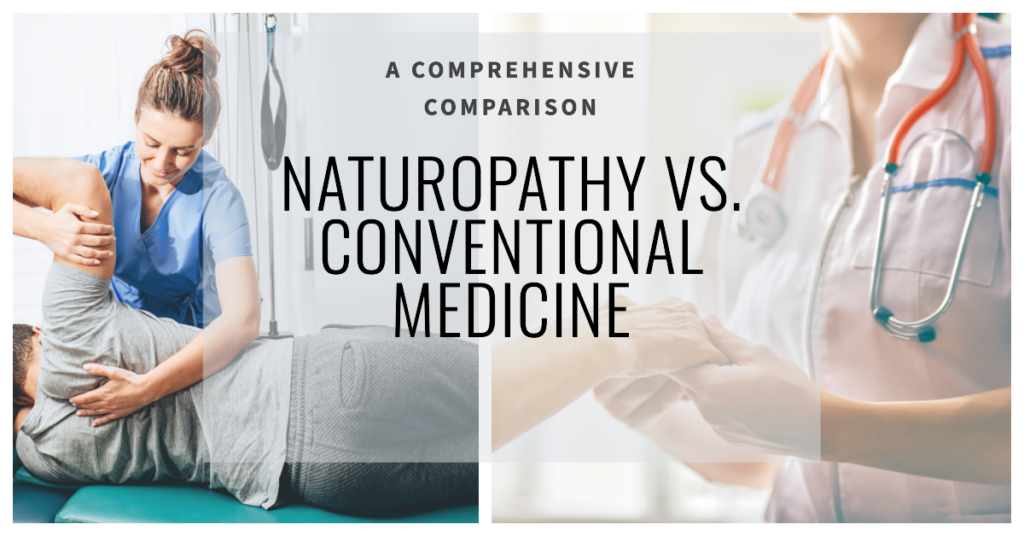Uncover the Core Principles of Naturopathy

Introduction to Naturopathy
Naturopathy is a holistic approach to health and wellness that emphasizes the body’s innate ability to heal itself. It seeks to promote optimal health by using natural therapies and treatments that work in harmony with the body’s natural processes. But what are the guiding principles of naturopathy, and how do they contribute to holistic health and wellness? Let’s explore the natural approach to healing and uncover the core principles of naturopathy.
The Core Principles of Naturopathy
Naturopathic medicine is founded on six core principles that guide the practice and philosophy of naturopathy. These principles are:
The Healing Power of Nature
Naturopathy believes in the body’s inherent ability to heal itself. This principle, known as “vis medicatrix naturae,” emphasizes that the body has a natural tendency to restore and maintain health. Naturopathic practitioners work to support and enhance this healing process by using natural therapies that align with the body’s own healing mechanisms.
First Do No Harm
Naturopathic practitioners follow the principle of “primum non nocere,” which means “first, do no harm.” They use gentle, non-invasive treatments that minimize the risk of harmful side effects. The goal is to support the body’s healing process without causing additional harm.
Treat the Whole Person
Naturopathy takes a holistic approach to health, considering the physical, mental, emotional, and spiritual aspects of a person’s well-being. This principle recognizes that each individual is unique, and treatment plans are tailored to address the whole person, not just their symptoms.
Identify and Treat the Cause
Naturopathic practitioners seek to identify and address the root cause of illness rather than merely treating the symptoms. By addressing the underlying factors contributing to a person’s condition, naturopathy aims to provide long-lasting relief and prevent recurrence.
Doctor as Teacher
Naturopathic practitioners view themselves as educators, empowering patients with the knowledge and tools they need to take charge of their own health. This principle, known as “docere,” emphasizes the importance of patient education and active participation in the healing process.
Prevention is the Best Cure
Naturopathy places a strong emphasis on prevention and proactive measures to maintain health and prevent illness. This principle encourages individuals to adopt healthy lifestyle choices and habits that support overall well-being.
Table 1: Core Principles of Naturopathy
| Core Principle | Description |
|---|---|
| The Healing Power of Nature | The body has an inherent ability to heal itself. Naturopathy supports and enhances this natural healing process. |
| First Do No Harm | Naturopaths use gentle, non-invasive treatments to minimize the risk of harm and support the body’s healing process. |
| Treat the Whole Person | Naturopathy considers the physical, mental, emotional, and spiritual aspects of an individual’s well-being. |
| Identify and Treat the Cause | Naturopaths aim to identify and address the root cause of illness rather than just treating the symptoms. |
| Doctor as Teacher | Naturopaths educate and empower patients to take charge of their own health and well-being. |
| Prevention is the Best Cure | Naturopathy emphasizes the importance of prevention and encourages individuals to adopt healthy lifestyle choices. |
The Benefits of Naturopathy
Naturopathy offers several benefits that make it an attractive option for individuals seeking a natural and holistic approach to health. Some of these benefits include:
- Natural and Holistic Healing: Naturopathy uses natural therapies and treatments that work in harmony with the body’s own healing processes. It considers the whole person, including their physical, mental, emotional, and spiritual well-being.
- Personalized Treatment Plans: Naturopathic practitioners recognize that each individual is unique and tailor treatment plans to address their specific needs and health goals.
- Focus on Prevention: Naturopathy emphasizes the importance of prevention and encourages individuals to adopt healthy habits that support overall wellness.
Common Therapies Used in Naturopathy
Naturopathic practitioners use a variety of natural therapies to support healing and promote wellness. Some common therapies used in naturopathy include:
- Herbal Medicine: The use of plants and plant extracts to support health and treat various conditions.
- Nutrition and Diet: Dietary recommendations and nutritional counseling to promote optimal health.
- Acupuncture and Traditional Chinese Medicine: Techniques that stimulate specific points on the body to balance energy flow and promote healing.
- Homeopathy: The use of highly diluted substances to stimulate the body’s healing response.
- Physical Therapies: Techniques such as massage, hydrotherapy, and exercise to support physical health and well-being.
Table 2: Common Therapies Used in Naturopathy
| Therapy | Description |
|---|---|
| Herbal Medicine | The use of plants and plant extracts to support health and address various conditions. |
| Nutrition and Diet | Personalized dietary recommendations and nutritional counseling to promote optimal health. |
| Acupuncture | A technique that stimulates specific points on the body to balance energy flow and promote healing. |
| Homeopathy | The use of highly diluted substances to stimulate the body’s healing response. |
| Physical Therapies | Techniques such as massage, hydrotherapy, and exercise to support physical health and well-being. |
| Lifestyle Counseling | Guidance on stress management, sleep hygiene, and other lifestyle factors that impact health and wellness. |
Techniques Used by Naturopaths
Naturopaths utilize a wide range of natural and holistic techniques to support the body’s healing process and promote overall wellness. Some of the most common techniques used by naturopaths include:
- Herbal Medicine: Naturopaths often prescribe herbal remedies to support the body’s natural healing mechanisms. Herbal medicine involves the use of plants and plant extracts to address various health conditions. Learn more about herbal medicine from the American Herbalists Guild.
- Nutrition and Dietary Counseling: Proper nutrition plays a crucial role in naturopathic medicine. Naturopaths provide personalized dietary recommendations and nutritional counseling to help individuals achieve optimal health. Explore the importance of nutrition from the Academy of Nutrition and Dietetics.
- Acupuncture: Acupuncture is a traditional Chinese medicine technique that involves the insertion of thin needles into specific points on the body to balance energy flow and promote healing. Discover more about acupuncture from the National Center for Complementary and Integrative Health.
- Homeopathy: Homeopathy is a system of medicine that uses highly diluted substances to stimulate the body’s healing response. Learn more about homeopathy from the National Center for Homeopathy.
- Physical Therapies: Physical therapies, such as massage, hydrotherapy, and exercise, are used to support physical health and well-being. Explore the benefits of physical therapy from the American Physical Therapy Association.
- Lifestyle Counseling: Naturopaths work with individuals to identify and address lifestyle factors that may be impacting their health. This may include stress management, sleep hygiene, and other aspects of daily living.
The Root Cause of Disease in Naturopathy
In naturopathy, the root cause of disease is believed to be an imbalance in the body’s natural systems. This imbalance can result from various factors, including poor nutrition, stress, environmental toxins, lack of physical activity, and emotional or psychological factors. Naturopaths seek to identify and address these underlying causes to restore balance and promote healing.
Naturopathic medicine emphasizes the importance of treating the whole person, not just the symptoms of a disease. By addressing the root cause of illness and supporting the body’s innate ability to heal, naturopathy aims to provide long-lasting relief and prevent recurrence.
Naturopathy also recognizes that each individual is unique, and the root cause of disease may vary from person to person. As a result, naturopathic practitioners take a personalized approach to diagnosis and treatment, tailoring their recommendations to meet the specific needs and health goals of each individual.
When to Consider Naturopathy
Naturopathy can be a valuable addition to conventional medical care for individuals seeking a holistic approach to health. It may be particularly beneficial for those with chronic conditions, those looking to prevent illness, or those interested in optimizing their overall wellness.
YouTube Video: Introduction to Naturopathy
Here is a YouTube video that provides an introduction to naturopathy and its principles. You can implement this video in your article to offer readers a visual and engaging explanation of naturopathy:
Please note that the video is provided for informational purposes and should not be considered an endorsement of any specific practitioner or treatment.
Finding a Qualified Naturopathic Practitioner
When seeking naturopathic care, it’s important to find a qualified practitioner who has completed accredited training in naturopathic medicine. Look for practitioners who are licensed or registered with a professional naturopathic association.
Limitations and Considerations of Naturopathy
While naturopathy offers many benefits, it’s important to recognize its limitations. Naturopathy should not replace conventional medical care for serious or acute conditions. Always consult with a healthcare professional before starting any new treatment or therapy.
Learn More About Naturopathy Through Online Courses
Are you interested in delving deeper into the world of naturopathy? Whether you’re a curious individual or an aspiring practitioner, our online courses offer a comprehensive and accredited education in naturopathy. Our courses are accredited by reputable organizations such as IPHM (International Practitioners of Holistic Medicine), CMA (Complementary Medical Association), and CPD (Centre of CPD Excellence).
- For an introduction to naturopathy, consider enrolling in our Introduction to Naturopathy course.
- If you’re seeking a more in-depth understanding, our Naturopathy Practitioner Training Course is the perfect choice.
- Explore our courses accredited by IPHM, CMA, and CPD to enhance your knowledge and skills in holistic medicine.
By enrolling in our courses, you’ll gain valuable insights into the principles and practices of naturopathy, empowering you to take control of your health and wellness journey.
Conclusion
Naturopathy is a holistic approach to health that emphasizes the body’s innate ability to heal. By following the core principles of naturopathy, practitioners seek to promote wellness and prevent illness using natural therapies. Whether you’re interested in addressing a specific health concern or simply looking to optimize your well-being, naturopathy offers a natural and holistic path to healing.
You may also want to read our full beginner’s guide to naturopathy.
FAQs
- What is naturopathy? Naturopathy is a holistic approach to health that emphasizes the body’s innate ability to heal itself. It uses natural therapies and treatments to support overall wellness.
- What are the core principles of naturopathy? The core principles of naturopathy include the healing power of nature, first do no harm, treat the whole person, identify and treat the cause, doctor as teacher, and prevention is the best cure.
- What types of therapies are used in naturopathy? Common therapies used in naturopathy include herbal medicine, nutrition and diet, acupuncture, homeopathy, and physical therapies.
- Is naturopathy a replacement for conventional medicine? No, naturopathy is not a replacement for conventional medicine. It can complement conventional care, but it should not replace medical treatment for serious or acute conditions.
- How do I find a qualified naturopathic practitioner? To find a qualified naturopathic practitioner, look for practitioners who have completed accredited training in naturopathic medicine and are licensed or registered with a professional naturopathic association.













Réponses